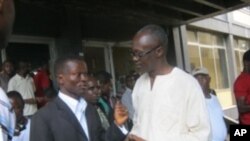A Liberian judge Tuesday ordered the re-opening of four radio and three television stations sympathetic to the opposition which the government shut down one day before runoff elections.
The government accused the stations of broadcasting hate messages and spreading misinformation aimed at causing insurrection and disorder.
Press Union of Liberia President Peter Quaqua, who was in the courtroom, says the judge, James W. Zota, did not make evidence available to the lawyers representing the media institutions.
Quaua says he views the action against the stations, and the subsequent court proceedings, as an attempt to frighten the media away from reporting critical issues in Liberia.
“The judge ruled that the petitions filed by the Ministry of Justice and the Information Ministry were corroborated by the evidence the Ministry of Justice provided to the judge. Dramatically, that evidence was never produced in court,” he said.
Quaqua says Judge Zota reviewed the evidence and said he was convinced the stations were guilty of broadcasting hate messages, misinformation and inciting violence.
In his ruling, Zota threatened to revoke the permits and broadcasting licenses of the stations if they repeated what he called the spreading of hate messages with the propensity to cause insurrection.
“We would have thought that the case would be used to teach some lessons, hopefully, to the media about some of the wrong things that their colleagues were doing. But, that did not happen, and what we picked from the whole process is nothing, but what I would like to refer to as an attempt to really scare the media away from reporting critical issues in our country,” Quaqua said.
The Press Union of Liberia president said he also views the whole episode as an effort to force the media into self-censorship.
“I think it’s further intended to intimidate the media and subject the media into self-censorship, which for me speaks negatively to the idea of press freedom and [the] professed desire of the government of a free press,” he said.
He said Liberians should be able to have confidence in their judicial system.
“If you have to go to court and be subjected to these kinds of irregular hearings, I think it doesn’t speak well, and we don’t put the court into the position where people are running away from the court. People will not respect the court,” he said.
Quaqua says a number of international organizations, including Reporters Without Borders, the International Federation of Journalists, and the Committee to Protect Journalists protested the closure of the stations.
“The West African Journalists Association, for instance, is also drafting a statement to criticize the closure of these media institutions. We are also pleased to note the solidarity of the media community in Liberia around this issue, which also sends a very strong signal to the government and the people of Liberia about the need not to trample on the media,” Quaqua said.
He said media organizations are not above the law, but the government cannot use the courts to reach an end.
“The situation of November 7th was unfortunate; we do not support that. But, we’d like to make it clear that the media cannot be used as a scapegoat in this matter,” Quaqua said.
Quaua called on Liberian journalists to continue to stay on the side of reporting public interest issues and not necessarily partisan issues.




